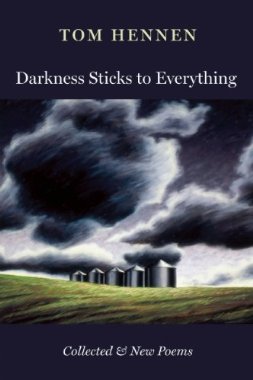Upon receiving my review copy of Darkness Sticks to Everything, the first thing I noticed was the unusual shape of the book—more square than rectangle, a comfortable fit in my small hands. Its table of contents is impressive at six-and-a-half pages and includes poems spanning fifty years. I randomly flipped the pages to sample a few of the poems. Immediately, I was taken by their brevity and concision.
I am a new reader of Tom Hennen’s work. Many times when I discover a poet, I begin with a collection such as this one so that I can get a sense of what he and his verse are all about. Tom Hennen is about expressing the complexities of life via the simplest observations. His poems are meditations on the natural world that reflect the human soul, reminiscent of Eastern forms.
Hennen was born, raised, and continues to live in rural Minnesota. He made his living working outdoors, first for the Minnesota Department of Natural Resources, then for the Sand Lake National Wildlife Refuge. In his poems, he writes what he knows—harsh winters preceded by colorful autumns and followed by glorious springs; the destructive effect of industry on his beloved landscape; a simple way of life disappearing as if into a hole:
Home Place
The old house went down the basement stairs
And didn’t come back up:
The people
The cows
The sheep
The pigs and the chickens
Have disappeared through a great hole
In the landscape.
Hennen repeatedly moves back and forth through this hole in the work included here from his first two books, originally published in 1974 and 1976.
There is great power in the deceptive simplicity of many of his poems, as in this one from his 1983 book, Looking Into the Weather:
The Rain Puts Out the Burning Autumn Grass
Quietly as smoke
The bare plum trees
Cover the hill.
Reading these verses slowed me down. I began to notice the rhythm of my own breathing. I realized all that I miss in the rushing of my contemporary life. These poems force you to look at what’s taking place beyond the activity that typically captures your attention. And in this refocusing, you discover one more world—the one inside yourself.
The verses from Tom Hennen’s 1997 collection, Crawling Out the Window, expand into longer prose poems. Though each is no more than one page long, these poems contain robust sentences and sometimes feature multiple paragraphs. The opportunity to examine a poet’s development over the course of his writing life is a strength of a volume like Darkness, especially for a reader who is herself a poet. Here Hennen retains his marvelous knack for imagery, but also has room to expound on the connections he was only able to imply in much of his earlier, briefer poems, as in this passage from “Crawling Out the Window:”
You find out that if you fall south, life will be easy as warm rain. You wake up with an outgoing personality and a knack for business. The river carries you. You float easily and are a good swimmer. But if you fall north while daydreaming, you never quite get your footing back again. You will spend most of your time looking toward yourself and see nothing but holes.
The final section of “New Poems” comprises more prose poems as well as many briefer lyric poems reminiscent of Hennen’s earlier work. Amazingly, Tom Hennen never waivers in his dedication to his subject matter. The new poems are filled with autumn leaves and spring rains over the great, empty plains, and “all is well.”
* * *
Karen Pickell is associate editor of Flycatcher.
